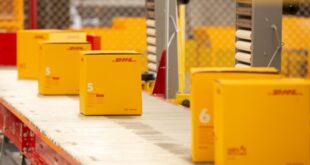The Ontario Convention Center is marking its 25th anniversary this year, having just survived as big a crisis as it’s ever likely to face.
The venue lost an estimated 300 events during the pandemic, according Michael Krouse, president and chief executive officer of the Greater Ontario Convention & Visitors Bureau and Shannon Perry, the convention center’s general manager.
“I think the worst of it is over,” said Krouse, who along with Perry oversees the convention center’s daily operations. “There’s some concern about this new strain that’s out there, but so far that hasn’t hit us. As a destination, I think we’ve come back.”
The facility’s most recent financial numbers appear to back up that statement.
During the fiscal year that ended June 30, the convention center hosted 323 events and nearly 298,000 attendees, according to Sue Oxarart, convention center spokeswoman.
Opened in December 1997, the city-owned convention center cost $66 million and took 20-months to build. Constructed on a 17-acre site at 2000 E. Convention Center Way near Ontario International Airport, the convention center hosts multiple events, including business meetings, car shows, gun shows, ComicCon Revolution and an annual gathering of Inland Empire vintners.
It’s operated by ASM Global in Los Angeles, which manages sports and entertainment venues worldwide.
“The convention center has helped the city immensely,” said Alan Wapner, Ontario city councilman for the past 28 years. “We wanted hotels and bed tax, and it’s helped us get that. It’s also given us an identity. People who otherwise wouldn’t know Ontario know where we are.”
Krouse and Perry spoke with IE Business Daily recently about the current state of the convention center, how it measures up to similar facilities in Los Angeles and Long Beach and what then future might hold for the venue.
Q: We might as well start by talking about COVID-19. Certainly that’s biggest challenge the convention center has had to deal with in its 25 years.
Shannon Perry: We’ve been able to get quite a lot of our business back, actually, the bulk of what wasn’t lost – about 300 events – we were able to reschedule. And the hotels [near the convention center] have also come back, which has helped a lot. I’d say we’re 90 percent back.
Michael Krouse: I think we’ve come back faster than the Los Angeles and Long Beach convention centers have. From what I hear, both of those places are a little slow. But one of the reasons for that is we aren’t Los Angeles or Long Beach. Unlike, those places we don’t get a lot of tourism. We get some, but not a lot. We’re a business market, it’s business travelers who come here, and that has worked to our advantage.
Q: How many of your employees did you have to let go?
MK: At one point we had eight people running everything. That was down from 1,000, and we had to move quickly when we started cutting back. It was very difficult. Fortunately, we’ve been able to bring most of them back. And we have some people working out of their homes.
Q: What kind of improvements did you make because COVID-19?
SP: We changed everything to LEED certified, and we tried to make everything green, as much as we could, to save money and do something for the environment. And we used our CARES money to do some renovations.
Q: How do you plan to mark the convention center’s 25th anniversary? It’s a significant milestone, especially having had to deal with the pandemic?
MK: Well, I’ve been here 10 years, and it was quite a ride even before COVID. (Laughs)
SP: We had a luncheon in April for stakeholders, hoteliers, and local business people, and we hope to have a community open-house event in December of this year, to celebrate the date of the first event.
Q: What do you know about the convention center’s first event?
SP: It was a benefit on Dec 1, 1997 for San Antonio Community Hospital. There were politicians, civic leaders, local dignitaries, and celebrities, and 956 people attended. It was $156 a ticket, which was a little pricey. Greg Devereaux, Ontario’s city manager at the time, said building the convention center signified the Inland Empire coming of age. It was a big step in the maturation of the region, and not only as a destination.
Q: How much do you believe the convention center has helped Ontario grow?
SP: It’s hard to put a number on it, but I think it has helped get more people into the hotels and Ontario Mills. Ontario’s population [about 170,000] by itself isn’t going to pay for the police and fire department. So I think we’ve helped.
MK: The hospitality industry in Ontario certainly has grown because of the convention center.
We have about 6,000 hotel rooms, which is unusual for a city this size.
Q: What is the most important part of operating a facility as large, and as complicated, as the convention?
SP: In our case we pride ourselves on providing good service. We don’t have anything like Disneyland, and we aren’t close the ocean. As we’ve said, our market is more business oriented, so we have to provide great service.
Q: How much have the improvements and upgrades at Ontario International Airport helped the convention center?
MK: It’s helped us a lot, and if they keep adding service, which they’ve said they’re going to and we’re very excited about that. And Mark Haneke, whom they just hired, is going to make a difference. He’s very respected in the aviation industry, and we’re looking forward to partnering with him. We need marketing, and that’s what he does. Ontario International just hosted the SMART Conference, which is one of the biggest gatherings of aviation executives. That never would have happened five years ago.
Q: Mike, you were second-in-command at the Los Angeles Convention Center when you agreed to come to Ontario. Are you glad you made that move?
MK: Yes, I wanted to be in charge, and I think it’s easier to get things done in Ontario. When the city says they’re going to do something they mean it, and usually it gets done. They aren’t blowing smoke. You still have political issues, but they don’t keep things from moving forward. Originally we didn’t have a convention and visitors bureau, but we started moving forward, we got the money and we did it.”
Q: Have you been able to get much business away from Los Angeles?
SP: L.A. has a lot of gatherings that we can’t accommodate. They have events with 100,000 people. About the most we can do is 15,000, which is a lot easier to manage.
Q: Is there any event that you booked that now you think maybe you shouldn’t have?
MK: Probably the vape show, which was about five years ago. At the time it was unique, and it got a good crowd, but attitudes toward vaping have changed. Looking back, maybe it wasn’t a good idea.
Q: Any regrets? Anything you didn’t do that you wish you had done?
MK: No, not really. We’re running a business, not a charity. I try to be open-minded.
Q: There’s a lot of talk about economy slowing down. Are you concerned about a possible recession?
MK: I’ve heard that and I’m not concerned about it. I don’t see it happening.
Q: Where would you like to be five years from now?
MK: I’d like to see an expansion, I’d like to see more development around the arena and a 400 to 500-room hotel added in the market. We’re working on all of that.
 IE Business Daily Business news for the Inland Empire.
IE Business Daily Business news for the Inland Empire.


